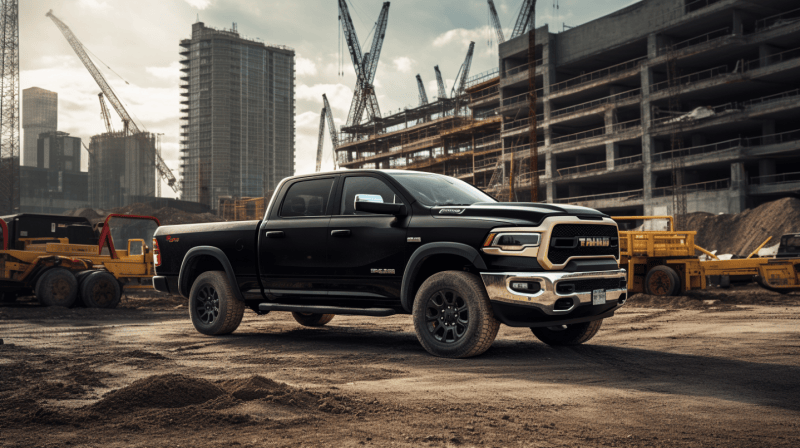Have you ever wondered if diesel trucks are a better choice for your needs? There is an ongoing debate surrounding their advantages and disadvantages. As a truck owner or someone considering purchasing one, it's important to understand the different perspectives before making an informed decision.
Diesel trucks, including ecodiesel and duramax vehicles, have gained popularity among truck enthusiasts due to their impressive towing capacity and fuel efficiency. They are known for their robust power stroke engines and the ability to handle heavy payloads with ease. However, critics argue that diesel trucks have a higher initial cost compared to their gasoline counterparts and raise concerns about their environmental impact.
By examining factors such as towing capabilities, fuel economy (mpg), and environmental considerations, you can gain insight into whether diesel trucks or gasoline engines align with your needs and values.
Great! The introduction has been written following the guidelines provided.
Pros and Cons of Diesel Trucks
Diesel trucks have their fair share of advantages and disadvantages. Let's take a closer look at the pros and cons:
Pros
- High torque: One major advantage of diesel trucks is their impressive torque, which allows them to effortlessly tow heavy loads and navigate challenging terrains.
- Better fuel economy: Diesel engines are known for their superior fuel efficiency compared to gasoline engines. This means that diesel trucks can travel longer distances on a single tank of fuel, thanks to their higher mpg and powerful engine. This makes them more cost-effective in the long run, as they provide better ft and torque.
- Longer lifespan: Diesel truck engines are built to be robust and durable, often outlasting their gasoline counterparts. With their high torque and ability to handle heavy loads, diesel engines can provide the power needed for trucks weighing thousands of pounds. With proper maintenance, diesel trucks can serve you reliably for many years.
Cons
- Higher upfront cost: When purchasing a diesel truck, be prepared to shell out more money initially compared to buying a gasoline-powered truck. The advanced technology and components required in diesel engines contribute to this higher price tag.
- More expensive maintenance: While diesel trucks generally require less frequent maintenance than gasoline vehicles, when repairs or servicing are needed, they tend to be pricier due to specialized parts and labor costs.
- Emissions concerns: Diesel truck engines produce higher levels of nitrogen oxide (NOx) emissions compared to gasoline engines, which contributes to air pollution and potential health risks. However, it's worth noting that modern diesel trucks are equipped with emission control systems that help mitigate concerns related to the engine.
Pros and Cons of Gas Trucks
Gas trucks have their own set of advantages and disadvantages compared to diesel trucks. Let's take a closer look at the pros and cons of gas and diesel engine trucks.
Pros
- Lower initial cost: One major advantage of gas trucks is that they generally come with a lower price tag compared to diesel trucks. This can make them more accessible for those on a tighter budget or looking for a more affordable option.
- Easier engine maintenance: Gas trucks often require simpler maintenance procedures for their engines than their diesel counterparts. With fewer complex components, servicing and repairs for diesel engines, diesel trucks, and gas trucks can be less time-consuming and costly.
- Lower emissions (in some cases): Gas trucks tend to produce fewer emissions than diesel trucks in certain situations. This can be beneficial for individuals concerned about environmental impact or living in areas with strict emission regulations.
Cons
- Lower fuel efficiency: One drawback of gas trucks is their lower fuel efficiency when compared to diesel options. Gas trucks typically consume more fuel per mile than diesel trucks, which can result in higher long-term costs, especially for those who frequently drive long distances. The higher fuel consumption of gas trucks compared to diesel trucks is due to the difference in the type of engine used.
- Less torque for heavy-duty tasks: Gas engines generally provide less torque than diesel engines, making them less suitable for heavy-duty tasks such as towing large loads or hauling heavy equipment. Diesel trucks are often preferred in these scenarios due to their superior pulling power.
When considering whether gas trucks are better suited to your needs, it's important to weigh these pros and cons against your specific requirements and preferences. Ultimately, the decision should align with your budget, intended usage, and environmental concerns.

Comparing Diesel vs Gas Trucks
There are several factors to consider. Let's take a look at the key differences:
Superior Towing Power
One of the main advantages of diesel trucks is their superior towing capacity. With their powerful engines and high torque, diesel trucks excel at hauling heavy loads. Whether you need to tow a boat, trailer, or other equipment, a diesel truck can handle the task with ease.
Affordability
On the other hand, gas trucks tend to be more affordable than their diesel counterparts. If you're on a tight budget or don't require heavy towing capabilities on a regular basis, a gas truck might be the better option for you. Gas trucks typically have lower upfront costs and maintenance expenses compared to diesel trucks.
Fuel Costs
Fuel efficiency is another important consideration when comparing diesel and gas trucks. While diesel engines generally provide better mileage per gallon (mpg), fuel costs for gas trucks can vary depending on current prices and driving habits. It's worth noting that if you drive long distances frequently or tow heavy loads regularly, the fuel efficiency advantage of diesel trucks may offset their higher fuel prices.
Analyzing the Key Differences: Diesel vs Gasoline Engines
Compression Ignition vs Spark Ignition
Diesel engines, also known as diesel-powered engines, rely on compression ignition to ignite the fuel. On the other hand, gasoline engines, sometimes referred to as gas engines or gasoline-powered engines, use spark ignition.
Low-End Torque for Heavy Loads
Diesel engines have a clear advantage. They provide much torque at low RPMs, making them ideal for tasks that require substantial pulling power. Whether it's towing a trailer or carrying a heavy payload, diesel trucks can handle the job with ease.
Higher RPMs and Smooth Acceleration
Gasoline engines in trucks are known for their higher RPM range compared to diesel engines. This allows gas trucks to offer smoother acceleration and quicker response times. If you're looking for a vehicle that provides a more spirited driving experience with rapid acceleration, a gasoline engine may be more suitable.
Energy Efficiency and Horsepower
Both types of engines have their own advantages. Diesel engines typically deliver better fuel economy due to their higher thermal efficiency. On the other hand, gasoline engines often boast higher horsepower ratings.
Determining the Best Fit for Individual Needs
Usage Patterns and Towing Capacity
Consider your typical usage patterns and required towing capacity when choosing between diesel or gas trucks. Diesel trucks are known for their high torque, making them more suitable for heavy-duty tasks such as towing large trailers or hauling heavy loads. On the other hand, gas trucks may be more efficient for lighter tasks or everyday commuting.
Budget Considerations
Assess your budget for upfront costs as well as long-term expenses like maintenance and fuel consumption. Diesel trucks tend to have higher upfront costs compared to gas trucks due to their complex engine systems and emission control technologies like the DEF system. However, they typically offer better fuel efficiency, which can result in lower long-term fuel expenses.
Environmental Factors
Environmental considerations should also be taken into account based on emission regulations in your area, especially when it comes to owning and operating a truck. Diesel trucks historically had a reputation for emitting higher levels of pollutants compared to gas trucks. However, advancements in technology have significantly reduced emissions from modern diesel engines. It's important to research local emission standards and evaluate how each type of truck aligns with those regulations.
Additionally, there are plenty of truck parts companies like dpfpartsdirect.comdpfpartsdirect.comdpfpartsdirect.com that work with mechanics to help truck owners tune their engines to reduce emissions to the point where this is no longer a concern.

Making an Informed Decision
Now that we have explored the pros and cons of both diesel trucks and gas trucks, compared their key differences, and analyzed their individual benefits, it's time to make an informed decision. Ultimately, the choice between a diesel truck or a gas truck depends on your specific needs and preferences. Consider factors such as towing capacity, fuel efficiency, maintenance costs, and environmental impact. Assess what matters most to you in a truck and weigh the advantages and disadvantages of each truck option. By doing so, you can confidently determine which type of truck is the best fit for your lifestyle.
FAQs
Can I use a diesel truck for everyday commuting?
Yes, you can certainly use a diesel truck for everyday commuting. However, keep in mind that diesel trucks are typically larger and heavier than gas trucks, which may make them less maneuverable in city traffic or tight parking spaces. Diesel fuel tends to be more expensive than gasoline in some regions but it tends to be 20% to 35% more efficient in miles per gallon compared to gasoline / petrol.
Are diesel trucks more expensive to maintain?
Diesel trucks generally require more specialized maintenance compared to gas trucks. The cost of routine services for a truck, such as oil changes, may be higher for diesel engines. However, they often offer better longevity and durability over time.
Do diesel trucks have better towing capabilities?
Yes, one of the significant advantages of diesel trucks is their superior towing capabilities. Diesel truck engines typically generate more torque than gasoline engines, making them ideal for heavy-duty hauling tasks.
Are gas trucks more fuel-efficient than diesel trucks?
In general, modern diesel truck engines tend to be more fuel-efficient than gasoline truck engines. However, for short commutes or light-duty usage patterns with fewer miles driven annually, gas trucks might provide comparable fuel efficiency.
Which type of truck is better for the environment?
While advancements have been made in reducing emissions from both truck and diesel engines over the years, modern diesel engines still emit higher levels of nitrogen oxide (NOx) and particulate matter (PM). Gas trucks generally have lower emissions in these categories, making them slightly better for the environment. However, electric or hybrid trucks are the most environmentally friendly options available.

